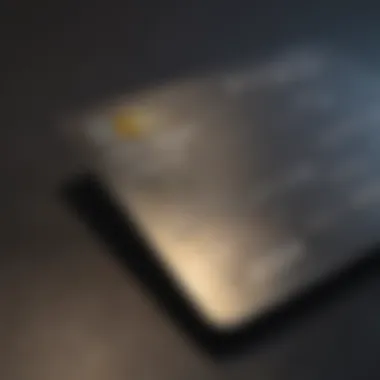How to Determine Your Credit Card Opening Date


Intro
In a world where credit cards have become ubiquitous, many people tend to overlook one important detail: when they actually opened their credit accounts. Knowing the opening date of your credit card is not just an afterthought; it’s a cornerstone of sound financial management. It can influence your credit score, inform you of potential promotional offers, and ultimately impact your broader financial strategy. This guide aims to shed light on various approaches to pinpoint this essential date, helping you gain clearer insights into your credit history.
Setting Financial Goals
Importance of Setting Goals
To find the opening date of your credit card, it’s wise to set some financial goals first. Having clear goals can guide your overall financial strategy, considering that monitoring your credit history is a crucial part of keeping your finances in order. Knowing when you opened your credit card can help you assess your usage habits and whether you are meeting your financial targets.
How to Establish Realistic Financial Objectives
When crafting your financial goals, think SMART: Specific, Measurable, Achievable, Relevant, and Time-bound. For instance, if you want to improve your credit score, start by focusing on how long you've had your accounts—your credit history—and how it can potentially affect your overall score. A well-defined objective could be:
- "Increase my credit score by 50 points in the next six months by keeping my credit utilization below 30%."
- "Review my credit report every three months to ensure that there are no errors."
Tracking Progress and Adjusting Goals
Regular assessments are crucial. Once your goals are set, tracking your progress allows you to see if you are on the right track. If something isn’t working, don’t hesitate to revise your objectives. You may find that you need to gather specific details about when you opened certain credit accounts as part of improving your financial health.
Budgeting and Expense Management
Creating a Personal Budget
Budgeting is another vital step in effective financial management. When you know your card's opening dates, you can align your expenditures accordingly. Start by listing all credit card transactions and categorizations. This will give you a clear view of where your money is flowing, helping you to create a personal budget that mirrors your lifestyle while considering your credit activities.
Tips for Cutting Costs and Saving Money
With insights gained from your budgeting efforts, it becomes easier to see areas ripe for cutting costs. Here are a few quick tips:
- Track subscriptions: Monthly fees can add up unnoticed. Cancel those you don't use.
- Cook at home: Eating out frequently can drain your funds more than you think.
- Use cash: For discretionary spending, paying with cash may keep you from overspending.
Tools and Apps for Tracking Expenses
There are several tools available to help with budgeting. Consider using applications like Mint or YNAB (You Need A Budget), which can assist you in tracking your expenses, allow you to set goals, and remind you of when payments are due.
Saving and Investing
Building an Emergency Fund
Having an emergency fund should be a primary saving objective. Ideally, this should cover three to six months' worth of living expenses. This cushion is vital in times of unexpected expenses without affecting your credit or requiring costly credit card use.
Types of Investment Options (Stocks, Bonds, ETFs, etc.)
Once your basics are covered, explore investments. Options like stocks, bonds, or ETFs can be beneficial to grow your financial portfolio. Understanding when you opened your credit card can shape your risk appetite when considering investments.
Strategies for Diversifying Your Portfolio
Diversifying your investments can help minimize risk. For example, mixing stocks with bonds or different types of funds can balance risk and yield potential returns. Research is crucial; find what suits your financial status and aligns with your goals.
Debt Management
Understanding Different Types of Debt
Debt management is intricate and involves understanding various types of debt—credit card, student loans, mortgages—each with different implications for your credit score. Knowing your credit card’s opening date can help evaluate your debt-to-income ratio, which lenders may look at when considering future loans.
Developing a Repayment Plan
If you have debt, consider creating a repayment plan based on your understanding of your credit card usage. Prioritize high-interest debts and aim to pay more than just the minimum payment. This strategy will help in reducing the interest paid over time.
Consolidation and Refinancing Options
If debts feel overwhelming, explore consolidation or refinancing options. These methods could reduce your monthly payments or lower your overall interest rates, allowing you more breathing room financially.
Retirement Planning
Importance of Early Retirement Planning
The earlier you start planning for retirement, the better off you’ll be. Just like understanding when you opened a credit card influences your current financial health, proactive retirement planning sets a foundation for the future.
Different Retirement Accounts ((k), IRA, etc.)
Different retirement accounts offer various advantages, like tax benefits. Consider investing in a 401(k) or an IRA to build that cushion over time.
Maximizing Retirement Savings with Employer Matching Contributions


If your employer matches contributions, take full advantage. It's free money that can significantly enhance your retirement savings if you begin early enough.
Understanding when you opened your credit card can lead to better decision-making for current and future financial strategies.
This article will continue to explore the various methods one can use to determine credit card opening dates and implications of these dates in depth.
Understanding the Importance of Credit Card Opening Dates
Understanding when you opened your credit card is more than just a trivial detail; it’s a cornerstone of effective financial management. The opening date serves as a marker for your credit history, influencing how lenders view your creditworthiness. When you know this date, you can make more informed decisions about your financial future, tailor your spending habits, and strategize for your credit score improvements.
In today’s credit-driven society, being savvy about your financial activities can make the difference between secure credit standing or landing in troubled waters. A clear understanding of opening dates especially comes to play when assessing your credit card applications, determining eligibility for specific offers, or even tackling intricate topics like credit utilization ratio.
The Role of Opening Dates in Credit Reports
Your credit report is like a financial report card, and opening dates feature prominently in this documentation. Each account you hold is recorded with specifics—opening dates included—affecting how credit scoring models evaluate you as a potential borrower.
The presence of recent accounts can also signal to lenders that you may be a higher risk, especially if multiple accounts open within a short time. In contrast, older accounts provide a sense of stability and demonstrate that you’ve successfully managed credit over an extended period. It’s worth noting that the age of your oldest account plays a major role in your credit score calculation. In practice, this means that knowing when you opened your credit card can significantly impact your future borrowing potential.
Impact on Credit Score Factors
There are a few moving parts when it comes to calculating your credit score, and the timing of when you open a credit card can influence several of these factors:
- Credit History Length: The longer your accounts have been open, the better for your score.
- Credit Utilization Ratio: This is determined by how much of your available credit you use. An older card with a high limit can help maintain a favorable ratio, provided you don’t max it out.
- Recent Inquiries: Multiple recent inquiries from credit applications can hurt your score, especially when opening new lines of credit.
Keeping track of your credit card opening dates not only helps in maintaining healthy credit but also enables you to recognize when you might need to reconsider your borrowing strategy.
Promotional Offers and Benefits
Credit card issuers often dangle bait in the form of promotional offers, like bonus points, cash back, or lower interest rates. However, you may only be eligible for these benefits if your card is a certain age or if you meet specific requirements related to opening dates.
For instance:
- New cardholders might receive bonus offers tied to spending within a promotional period following the card's opening date.
- Different tiers of rewards programs may launch based on how long your card has been active.
Knowing the exact date you signed up means you can capitalize on these incentives at the right time. If your account recently opened, you might want to manage your spending habits differently to unlock enticing rewards without overspending.
"An understanding of your credit card's opening date and its implications can transform your financial decision-making process."
The importance of opening dates goes beyond just keeping track; it’s essential for maximizing your financial leverage in a world where information is often your most powerful asset.
Retrieving Information from Your Credit Card Issuer
When it comes to tracing the opening date of your credit card, turning to the issuer is an essential step. These institutions possess the most accurate records, making them a viable resource for obtaining specific details about your account. By communicating effectively with your credit card company, you elevate your chances of gathering the information you need for mastering your finances.
Contacting Customer Service
One might think, "What’s the point of dialing a customer service number?" Well, this simple act can unlock a treasure trove of information. Customer service representatives are often the first line of contact for any inquiries regarding your financial accounts. They are trained to assist with various concerns, including the elusive opening date of your credit card.
- Prepare Your Information: Before you make that call, ensure you have your personal information handy—this includes your account number, Social Security number, and any other identifiers the company requires. The smoother the interaction, the quicker you'll get answers.
- Be Specific: When talking to the representative, don’t beat around the bush. Clearly state your request for the account opening date. Specificity can often expedite the process as it allows the representative to dive directly into the right records.
- Take Notes: While conversing with customer service, jot down any relevant details they provide. This documentation may assist you in future dealings should you encounter any discrepancies with the information given.
Using customer service is not just about retrieving data; it’s also an opportunity to deepen your relationship with your credit card issuer.
Using Mobile Apps for Account Management
If making phone calls feels tedious, many credit card issuers now offer mobile apps, making account management not just easier, but often more insightful. A few taps on your smartphone can yield the information you seek without any hassle.
- Convenient Access: Most mobile applications allow immediate access to your account history. As such, spending a few minutes reviewing your account might reveal the opening date within your transaction history.
- Notifications & Updates: Sign up for notifications that keep you informed about account changes or promotional offers you might miss otherwise. Occasionally, issuers highlight key account milestones that can point you towards your opening date.
- Comprehensive Features: Explore features that let you view account activities from the day you opened it. The timeline can help you not only track your credit usage but also figure out when you got that card in your wallet.
Utilizing mobile applications eliminates the middleman, providing a direct line to your account history that can enhance your financial literacy.
"In an age where everything is at your fingertips, using tech to manage finances is not just wise; it's essential."
Understanding how to retrieve information from your credit card issuer paves the way for better financial oversight and planning. With these steps, you can effectively track your credit card opening date and its implications for your financial health.
Reviewing Physical Documentation
Understanding the physical documentation related to your credit card is a vital piece of the puzzle when it comes to identifying when you opened it. This aspect holds significant weight in demystifying your financial history. The fundamental advantage is that many individuals have a tendency to overlook their physical records. However, these items serve as treasure troves of information.
When you review your physical documentation, the benefits are multifaceted. It can help answer not just the question of when you opened a credit card, but also provides insight into your spending habits and credit line changes over time. Additionally, tracking these elements via physical documents creates a tangible record that can be referred back to anytime you feel uncertain about your credit history.
There are a few key considerations to keep in mind during this process:
- Security: Physical documents can contain sensitive information. It's essential to store them safely, perhaps in a secured filing cabinet or locked drawer.
- Organization: A disorganized stack of papers won’t do you any good. Sorting through these documents and keeping them in order will aid you tremendously in your financial tracking efforts.
- Consistency: Making a habit of reviewing these documents regularly can foster a clearer understanding of your credit management overall. Just like with any aspect of finance, consistency is key.
"Keeping tabs on your credit card history through physical documentation can feel a bit like piecing together a jigsaw puzzle—you’re putting together bits of your financial life to see the bigger picture."


Analyzing Statements and Welcome Letters
Your credit card statements and welcome letters hold the keys to numerous details about your account. The welcome letter typically comes when you receive your credit card and often features essential information, such as your account number and the credit limit. This letter usually contains the date related to when your account was officially opened, making it a crucial document to consult.
Furthermore, reviewing your monthly statements enables you to track spending over time and observe any changes in your credit line or payment due dates. A consistent pattern of your purchases can also provide hints about your financial habits and priorities. Look for the initial statements issued right after opening your account, as they are typically labeled with the dates that pertain to your account's recent activity.
Sign-Up Forms and Terms and Conditions
The sign-up forms and terms and conditions, while often overlooked, are essential readings in this journey toward self-awareness. These documents generally include your signature, which acts as a binding agreement and often lists the date of signing. This date is significant as it typically aligns closely with the opening of your account.
Additionally, alongside those forms, the terms and conditions outline the rules and regulations governing your credit card usage—from interest rates to late fees. Understanding these details can help you make more informed financial decisions in the future. Recall that keeping track of these aspects not only demystifies the opening date of your credit card but also arms you with knowledge that could influence future credit card applications and negotiations.
Utilizing Online Banking Tools
In our digital age, it’s hard to overlook the role online banking tools play in managing financial affairs efficiently. When it comes to identifying the opening date of your credit card, these tools serve as more than just a convenience—they are pivotal resources that can simplify your journey into understanding your credit history. The integration of technology into banking has transformed the way individuals access and manage their finances, allowing for real-time insights and clear tracking.
Accessing Account History
One of the foundational features of online banking is the ability to access your account history. When you're trying to pinpoint when you opened a credit card, this section often holds the key to unlocking that information. Here’s what you can do:
- Login to your account: Accessing your online banking portal is the first step. Most banks require a username and a password, so make sure you have those handy.
- Navigate to account services: Once you're in, look for sections labeled something like "Account History" or "Transaction History." This can differ from bank to bank, but most will have a clear path to your account details.
- Set parameters for your search: Many online banking platforms allow you to filter the view by date. You can set this to a year or month back to when you think you might have opened the account. This will aid in giving you a narrower time frame.
- Review the early transactions: By doing this, you can scrutinize the first transactions made on the account. Often, the very first charge or credit can be right when the card was activated. Pay attention to any welcome bonuses or promotional offers that might have indicated an activation date.
By following these steps, you should be able to glean the pivotal information on your account's inception, which could very well influence your broader banking strategy.
Requesting a Complete Account Statement
If you’re still in the dark about your card’s opening date after accessing your account history, your next recourse is to request a complete account statement. A full statement can serve as an official record of your account’s journey, often displaying important details regarding account initiation. Here’s how you can go about this:
- Locate the statement request function: Most online banking environments will have a requests or statements section under account services. It might say "Print Account Statement" or "Request Statement."
- Choose the specific timeframe: You might have the option to generate a statement for a specific time. Choose the date range for around the period when you believe you opened the credit card. This should aid in getting a snapshot of account activity.
- Download or view your statement: Most banks provide electronic copies of your statements. You can either download them as PDFs for easy reading or view them directly in your browser.
- Analyze the statement: Look at the first few entries in your statement for any charges or notes that indicate when your account was opened. The top section of your statement often shows account labels and significant dates.
An account statement not only helps in confirming the opening date but also offers insights into how you've managed your credit. Understanding the initial activity can provide valuable lessons and aid in strategizing future financial decisions.
Remember: Tracking your credit card opening dates and overall spending habits can pave the way for better financial decisions in the long run.
With online banking tools at your disposal, identifying your credit card opening date is more accessible than ever, empowering you to take control of your financial future.
Consulting Your Credit Report
A credit report is often viewed as the skeleton key of financial history. It provides not just your credit score but also a comprehensive view of your credit accounts, including when they were opened. Therefore, consulting your credit report is invaluable for identifying when you opened a credit card. Understanding the nuances present in these reports can help one navigate the financial maze with more ease.
When discussing the importance of credit reports, several things come to the forefront. For starters, they’re packed with details that can be enlightening. If you’re trying to determine when you opened a particular credit card, your credit report is where the rubber hits the road. This is particularly vital if you are working on improving your credit score; knowing timelines is essential. By consulting your report, you not only see the opening dates but also the account status, payment history, and more.
It's also worth noting that each credit bureau may present information somewhat differently. Therefore, accessing all three—Equifax, Experian, and TransUnion—can provide a complete picture. Each report can hold clues that may get lost in a single source. Checking multiple reports ensures you won’t miss any vital information regarding your credit card history.
"Your credit report is like a report card for your financial life. Pay attention to it and learn from it."
Understanding Credit Report Components
Getting into the weeds a bit, credit reports contain several key components that anyone trying to find their credit card opening date should understand. These components generally include:
- Personal Information: Details such as your name, address, and Social Security number.
- Account Information: Your accounts, including credit cards, loans, and other debts. This section is where you’ll find the opening date.
- Payment History: Records of how timely you’ve been with payments; late payments can affect your score negatively.
- Credit Inquiries: A record of when lenders have checked your credit, which can also give some context to your credit activity.
Navigating this information can seem daunting, but once you're familiar with the terminology and layout, you can pinpoint what you need quickly. Taking the time to understand these elements may seem like a chore, but it pays dividends.
Requesting Free Annual Credit Reports
In the digital age, accessing your credit report has become easier than ever. Every individual is entitled to one free credit report annually from each of the three major bureaus. This means you can gather a comprehensive overview of your credit history without reaching for your wallet.
To request your reports, you can easily visit the AnnualCreditReport.com site which is authorized by the federal government. Here’s a quick guide on the steps:
- Go to AnnualCreditReport.com: It's the only site sanctioned for free access.
- Fill Out the Form: Enter your personal information and choose which credit bureau to obtain your report from.
- Review Your Report: Check for the opening dates of your various credit accounts.
- Store Safely: Save the PDF version or take notes, as this will be an important reference.
By requesting your reports once a year, you not only get to find your credit card opening dates but also ensure that your financial history is accurate and up-to-date. Mistakes can happen, and catching them early can save you from future headaches as you work toward your financial goals.
Cross-Referencing with Other Financial Accounts
When diving into financial management, keeping track of all expenses and sources of credit is vital. Cross-referencing your credit card activity with other financial accounts can shed light on how your spending habits impact your creditworthiness. This practice not only aids in pinpointing when you opened a credit card but also helps you draw connections to your overall financial landscape. Here are some significant elements to consider:
- Understanding Credit Card Usage: By linking credit card transactions to your checking or savings accounts, one can get a clearer picture of your spending habits. It's enlightening to see how often you rely on your credit card versus cash or debit. You might notice patterns that could inform you about your spending triggers. For instance, if you tend to overuse plastic during specific months, you may need to rethink your budgeting strategy.
- Minimizing Overspend: Keeping a keen eye on how much you spend throughout various accounts can highlight potential areas of overspending. If your credit card balance is consistently high while your bank account runs low, it could signal a red flag about your financial health. Recognizing this allows opportunities for adjustments before things spiral out of control.
- Credit Utilization Ratio: This ratio is critical for credit scoring. Cross-referencing your credit card usage with your total available credit gives a layered understanding of your financial behaviour. Lowering this ratio by spreading expenses across multiple payment methods can positively impact your credit score, ensuring you maintain a healthy financial profile.
- Timing Transactions: When you open a new credit card can be affected by your other financial engagements. Linking various accounts can provide insights into your overall financial timing—like if you typically open a card around income payday or during planned expenditures. This habit can bolster your credit when you're vigilant about payments and balances after such purchases.
"Understanding how your credit interactions link back to your other financial activities can be the turning point in better credit management."
Linking Other Banking Activity to Credit Usage
Linking your credit card transactions with other banking activity isn't just about numbers. It's about stories—stories of spending priorities, future plans, and potential financial pitfalls. For example, let’s say you've set a goal for a new car. If your credit card statements show a pattern of taking on extra debt around the time you're saving for that purchase, it leads to a reflective financial conversation. You can consider whether those purchases truly align with your priorities.


To make this as practical as possible:
- Review linked accounts monthly to see what expenses are regular and which are spontaneous.
- Set up alerts for credit card usage that crosses a set threshold, allowing for quick adjustments to avoid undesirable debt.
Tracking Spending Patterns and Trends
Spending patterns might reveal much about yourself and your financial habits. It can be eye-opening when you analyze how often you swipe that credit card for takeout versus groceries.
Here are a few ways to track these trends:
- Budgeting Apps: Consider using mobile applications that aggregate spending data from various accounts. They can automatically categorize and visualize your expenditures, giving you an overarching view.
- Account Syncing: Regularly sync your financial accounts, so you have up-to-date spending insights. Seeing categories like “eating out” and “entertainment” in real time can spur actionable changes if you notice overspending.
With the information gathered from both credit card transactions and linked accounts, you can make informed decisions going forward. You'll gain clarity on when the best time is to open a new line of credit, based on observed trends in income and spending.
Overall, cross-referencing with other financial accounts is a proactive measure that cultivates financial awareness. As you piece together the puzzle of your credit card activity, using insights from various financial fronts can make a significant impact on improving your credit health.
Organizing Your Financial Records
Managing one’s finances can often feel like trying to build a house of cards; one wrong move, and everything could come tumbling down. In the realm of personal finance, establishing a systematic method for organizing your financial records can play an undeniable role in navigating the complexities of credit cards and their nuanced ins and outs. The ability to locate information quickly when needed not only brings peace of mind but also enhances overall financial health.
Establishing a Personal Finance Tracking System
Creating a personal finance tracking system can be seen as laying the foundation of your financial infrastructure. This system serves as the blueprint with which you can monitor expenses, understand spending habits, and even identify credit card opening dates when necessary. Why is this so important?
- Centralized Information: With a tracking system, all your financial details, including credit card balances, payment due dates, and opening dates, can be in one place. No more hunting around; everything is at your fingertips.
- Enhanced Budgeting: By closely tracking spendings, you become more aware of your financial habits and can adjust your budget accordingly. This is particularly crucial for ensuring you’re maximizing any benefits your credit cards might offer.
- Easier Access to Historical Data: Historical data helps inform future decisions. By knowing when you opened your credit cards, you can plan when to request new ones or renegotiate terms on existing ones.
To set up your personal finance tracking system, consider simple tools such as spreadsheets or dedicated budget apps. You might jot down each opening date along with relevant account details, making it easier to consult when needed.
Creating a Reference Document for Credit Accounts
The importance of a well-organized reference document for your credit accounts cannot be overstated. This document acts like a master key to your financial life, ensuring that you have quick access to essential bank details that might otherwise be buried in a pile of paperwork. Here’s what to keep in this document:
- Credit Card Companies and Contact Information: Should you need to inquire about an account, having this readily available is invaluable.
- Opening Dates and Limits: Keeping track of when each card was opened and their credit limits offers insight into how your financial footprint has evolved over time.
- Annual Fees and Rewards Programs: A clear outline of any fees versus benefits helps decide whether certain cards are worthwhile to keep.
By maintaining this reference document, you benefit from better organization and the ability to make informed decisions quickly. Additionally, having pertinent information organized does more than streamline inquiries; it can also reveal credit opportunities or warnings before they become serious issues.
"A penny saved is a penny earned," but a well-organized document is priceless when it comes to managing your financial health.
Overall, organizing your financial records can radically change the way you handle your credit. The investment of time in setting up these systems pays dividends in the long run, leading to quieter nights and evenings spent without the cloud of financial confusion hanging over your head. Plus, it equips you with the knowledge to make astute decisions that can significantly impact your financial future.
Learning from Past Credit Card Experiences
Understanding how past experiences with credit cards can shape your financial behavior is vital. When we look back at our earlier applications and credit usage, we gain insights that can ultimately guide our future decisions. This retrospective can help us avoid costly mistakes and make smarter choices, teeming with prospective benefits.
Analyzing Previous Credit Card Applications
Diving into the past helps illuminate patterns. By examining your previous applications, you might uncover things like:
- Approval Rates: What kinds of cards were you able to obtain? Knowing whether you were frequently accepted or denied can help in choosing future cards.
- Annual Fees and Interest Rates: Reflect on the costs associated with your earlier cards. High fees can quickly erode the benefits of rewards programs. Consider if those expenses were justifiable.
- Credit Limits: Note how your credit limits changed over time. High limits might have encouraged spending, which isn’t always a good thing.
Many folks ignore these critical lessons, thinking they won’t repeat past mistakes. But, as the saying goes, "fool me once, shame on you; fool me twice, shame on me." If you can learn from your own history, you won’t have to experience similar blunders again.
Leveraging Lessons for Future Credit Decisions
Once you've taken stock of your credit card history, it’s time to leverage those experiences for future benefits. Here’s how:
- Choose Wisely: Based on your past experiences, select credit cards that better match your financial habits. This could mean avoiding high-interest cards if you tend to carry a balance.
- Reward Programs: If previous cards offered rewards that weren’t useful, opt for cards providing benefits that truly align with your spending patterns, like travel or cashback.
- Monitoring Payment History: Past habits can reveal whether you consistently paid on time or struggled with payment. Use this knowledge to form a solid payment strategy moving forward.
"Knowledge is power, but only if it's applied wisely."
Closure: The Path to Financial Awareness
Understanding your credit card's opening date is not just a trivial detail; it's a cornerstone in the foundation of your overall financial health. When you grasp the implications of this date, you can make informed decisions that may sculpt your financial future significantly. Knowledge is power, as they say, and being aware of your credit history lets you take control of your financial narrative.
The Significance of Tracking Credit History
Tracking your credit history has a ripple effect on various aspects of financial management. One significant point is understanding how your credit utilization ratio is affected by the age of your accounts. The older your credit lines, the better it is for your credit score. With each new account you open, the average age of your credit may decrease, impacting your score negatively. This makes it crucial to keep tabs on when you opened each credit card.
Furthermore, having a precise history allows you to spot errors or discrepancies on your credit report, which could otherwise lead to bad decisions. Mistakes in your credit history can happen, and being vigilant about your credit timeline means you can address these issues quickly.
What’s more, a well-tracked credit history boosts your negotiating power when seeking better rates for loans or credit cards. Lenders often favor those with a longer, solid track record of responsible credit usage.
Setting Goals for Improved Financial Literacy
Establishing clear, actionable goals around financial literacy can lead to smarter choices in managing credit. Think of it like this: if you don't have a map, how will you know where you're going? Having well-defined goals enables you to chart a course.
- Educate Yourself: Read books, take courses, or follow financial news to stay up-to-date. Harness resources like Britannica or Wikipedia for credible information.
- Regular Reviews: Make it a habit to review your credit report at least annually. This practice can help to identify errors as discussed before and monitor your credit development.
- Budgeting: Learn to create a realistic budget that includes details on how you manage your credit spending. This helps not only with understanding when you can pay off debts, but also illuminates any spending habits that may affect your credit score.
- Prioritize Healthy Credit Practices: Convert knowledge into action by paying bills on time and keeping debt levels low. This step can notably enhance your credit profile.
"A penny saved is a penny earned." This old saying rings true when you consider that understanding and managing your credit well can lead to significant savings down the line.
In summary, your credit history isn't just a collection of numbers; it's an intricately woven tapestry that deserves attention. Knowing when you opened a credit card is part of the larger picture of your financial life. Improved financial literacy can lay the groundwork for future stability and growth. The better you know your financial ins and outs, the stronger a position you'll find yourself in.



